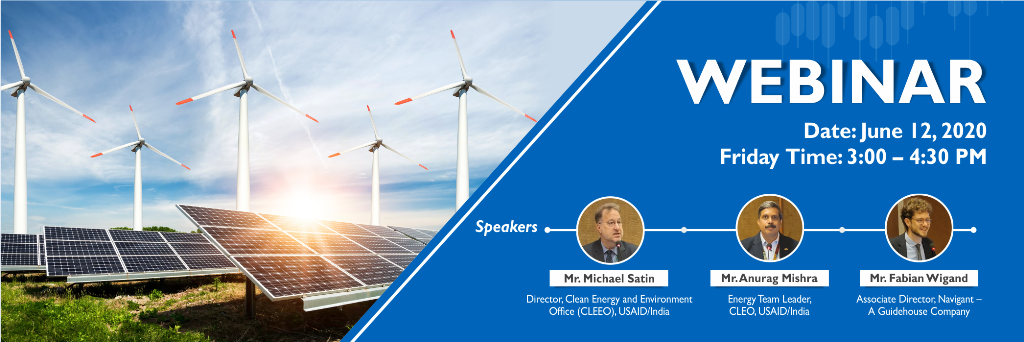Webinar on System-Friendly Procurement through Round-the-Clock Power-Driving Renewable Energy Deployment in India
On June 12, 2020, U.S. Agency for International Development’s (USAID) Partnership to Enhance Clean Energy Deployment 2.0 Renewable Energy (PACE-D 2.0 RE) program hosted a webinar, “System-Friendly Procurement through Round-the-Clock Power-Driving Renewable Energy Deployment in India.”
The Webinar was inaugurated by Mr. Michael Satin, Director, Clean Energy and Environment Office (CLEEO), USAID/India. Mr. Anurag Mishra Senior Team Leader Clean Energy USAID set the context of the webinar by explaining concept of RTC, how and why it is relevant for India. Mr. Fabian Wigand, Associate Director, Navigant provided the various renewable energy procurement models adopted across globe. This inaugural session was followed by a panel discussion moderated by Mr. Ronnie Khanna, Component Lead, PACE-D 2.0 RE Program. The panel consisted of representatives from Solar Energy Corporation of India (SECI), The World Bank, ReNew Power and SembCorp India.
System-friendly competitive procurement considers the system costs and benefits of renewable energy (RE) in the award decision by minimizing both generation and system integration costs. Round the Clock (RTC) Power through RE reflects the demand patterns of the DISCOMs and the consumers, which can address this issue by combining the benefits of low cost RE with the challenges of grid integration in the award decision. RTC through RE Power can address several grid integrations issues at the source and provide stakeholders (DISCOMs, large users) the ability to utilize the long-term benefits emanating from RE.
The USAID PACE-D 2.0 RE Program highlighted some of the opportunities and challenges around RTC Power through RE and conducted a broad-based debate on this topic, that provided a better understanding of the RTC Power through RE with the support of a series of discussions with key experts. The segment looked at the potential of this procurement methodology for the Indian market and the RTC scheme of the Ministry of New and Renewable Energy (MNRE), the SECI bids and their overall approach. Experts from PACE – D 2.0 RE also reviewed similar initiatives across the globe – from deployment of system friendly procurement in the US to Chile and Germany.
The Webinar also threw light at the potential policy and regulatory challenges, that the development of these projects is likely to face, especially those around evacuation and the bundling of power from different sources to supply to various users.
Webinar recording of this event is available here.
Presentation


